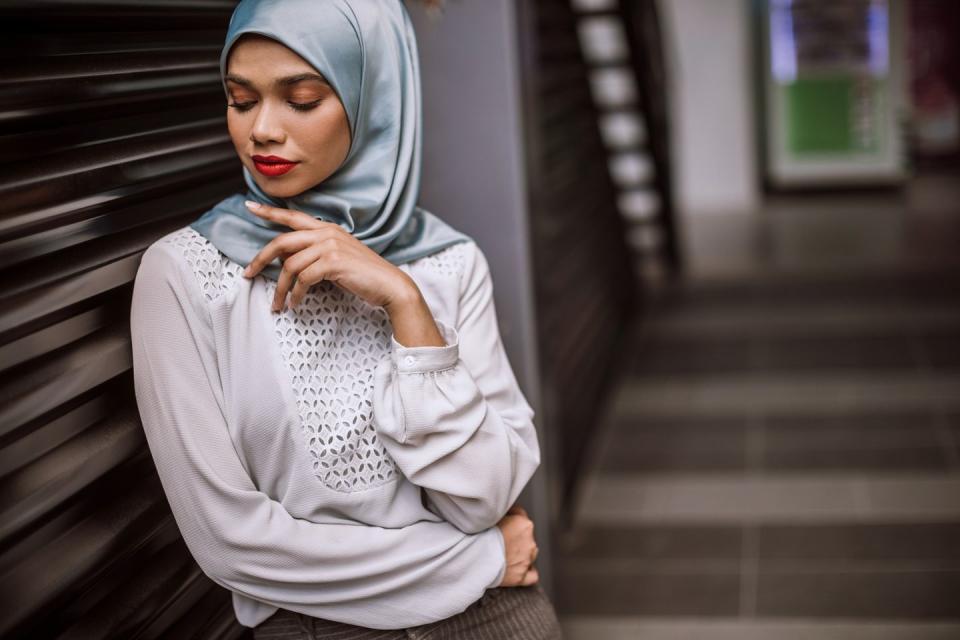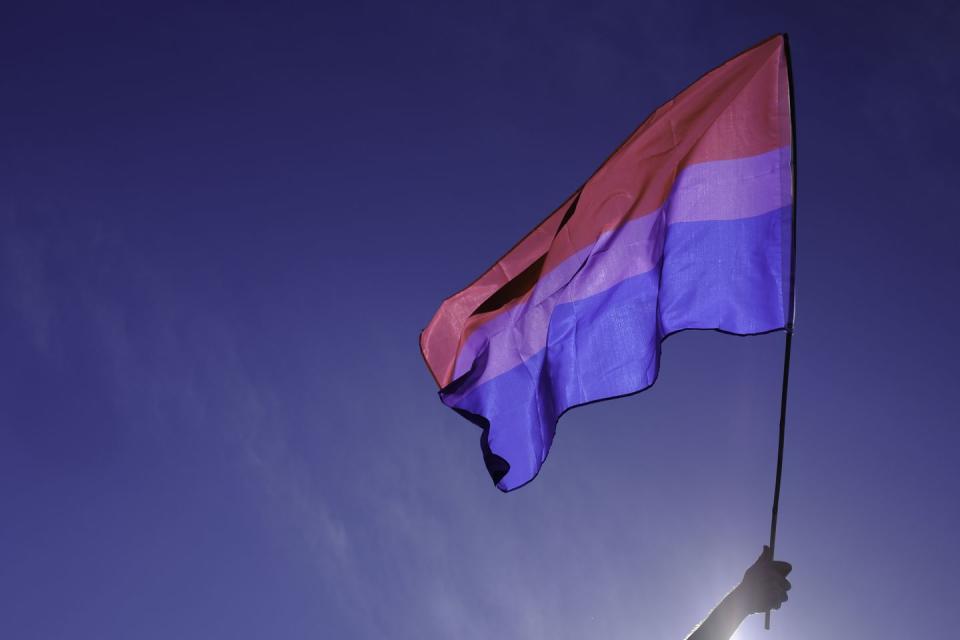‘I’m proof that bisexual Muslims exist — and are thriving’

I’m a lot of adjectives: Muslim, bi, genderqueer, Indian, hijabi, autistic, disabled... My identity reads like a checklist for a diversity seminar. Put together, these words make a lot of people upset. All these aspects intersect to make me who I am, and how I move through the world. It’s been a process even accepting all of them. Being bi seems like such a small aspect of me compared to the others, and yet it’s been the most divisive.
Being raised and socialised as female in South Asian culture can be exhausting – especially when you’re queer. If you’re a woman, you’re expected to get a degree, to meet a man, get married, be an excellent daughter-in-law (unpaid housekeeper), and have many, many babies. Gender queerness be damned. So, what happens if you’re bi? Well, that’s easy, you can still marry a man!
Being bi means you can choose, right? Your alarmed aunties are just grateful you’re not “fully gay”. Your bi identity is a shameful secret, but at least it can be “fixed”.
Dating when you’re bi, brown, and Muslim can be a minefield. Your dates assume you might be a virgin, or that you’re asexual. And some of us are, but the immediate assumption can be pretty awkward. Worse still, is when your date thinks that you can’t be a serious option. Because some of us brown bi Muslims aren’t out to everyone. Or your date might assume that you secretly hate yourself and wish you could be straight and/or cis. You’re just experimenting. Getting the bi out of your system before you settle down for real.
Growing up as a Muslim woman, owning my own sexuality wasn’t really an option. In my early years as a baby bi, flirting with anyone felt like breaking some unwritten rule. Add neurodivergence to the mix, and it’s as if everyone is speaking a completely different language. It can be hard to disentangle yourself from who you’ve been raised to be. Even now, there are people who once knew me who are worried for my soul, concerned that I’ve gone down a dark path because of the very queer life I’ve chosen.
I think back to when I was 18, ten years ago now. I’d agreed to see some rishtas, or marriage proposals, to appease concerned family friends. They were worried about my future, and who would provide for me. At no point was I given the agency of independence, not even in their thoughts. I had to get married, so a man could provide for me. And I sat there and allowed it, sitting across from a man who couldn’t even make eye contact with me – not because he was religious, but because he had never socialised with women before. The first words he spoke were to ask his own mother to make him some tea. My auntie ushered me into another room to have me make it instead, because, “Beta [child], you have to learn these things if you want to get married”.
It is so surreal looking back at that moment. I am married now, to a lovely polyamorous queer who is also white and Catholic. I think that auntie would have a heart attack if they met them. Depending on our work schedules, I even make more money than my spouse sometimes! I live for the subversion of gender roles, after having to live by them for so long.
After feeling so confused about where I belonged, I found the queer community. Even now, it’s been... complicated. There are fellow queer people who always assume I’m straight, because of my religion. My hijab says so much for me, without me speaking. People would erase my bi identity based on assumptions about the person I was in a relationship with. And for all the positivity and representation around Pride, the mainstream world hasn’t fully embraced people like me. We sit in a weird space. Queer Muslims are tolerated by some, hated by others, and ignored by most.
Even the most well-meaning allies can make you feel ostracised when you’re treated as an unusual creature. People have assumed I am homophobic, or asked what led me to being an ally. Even working for an LGBTQ+ charity, I am looked at with suspicion. I am given a look-over indiscreetly, before I’m always asked, “And you’re...?” while someone waits for me to fill in the blanks. To explain why I’m here. Hell, why I’m queer, too.
I used to fill those blanks immediately, announcing my queerness at all times. Just to let people know that I was safe to be around, so that they would accept me. It took a friend asking me why I did that for me to snap out of it. If people assumed I was homophobic, that was their Islamophobia showing. If they can’t fathom that people like me can be bi, that’s their problem. I don’t need to explain my existence to anyone. And perhaps that may seem selfish of me. But if you’re happy, does it matter?

The mainstream queer community may reject me, other Muslims may reject me. But other queer Muslims always have my back. We all know what it’s like, to grow up “wrong”, to be a disappointment before you’ve even done anything of note in this world. Some of my queer Muslim friends are of faith, and others aren’t. As much as external media likes to portray ex-Muslims and Muslims as sworn enemies, we will always have a kinship. Regardless of what faith or spiritual belief we may have, many of us were raised in similar environments – a hot pressure cooker of needing to be academically brilliant, not too loud, and perfectly obedient. And we all rebelled. I love that for all of us.
[Over the years], I got very involved with the LGBTQ+ network and was eventually kindly nominated for a Stonewall Bi Role Model of the Year award. And I won. I’d never won anything before. When I found out I’d won, I called people and told them. That’s how I fully came out as bi at 25 years old, almost four years ago. And ever since then, supporting my queer community has just felt completely right.
Ever since that award, I’ve carried a bit of imposter syndrome with me. What gives me the right to tell people the hows and whys of being bi? But the more bi folk I meet, especially bi people of colour, the more I see how wrong I am. We have the authority to talk about ourselves. For too long, other people have put words in our mouths. Cis people have written at length about trans people, white authors about Black culture, and I’m sure the studies done by heterosexual people on us queers are numerous. We are experts on our own lived experience. I don’t need a degree to speak about my life. I know what it feels like to live as a marginalised person.

I don’t come from privilege, but I live in a lovely queer bubble now. I am allowed to be completely out to everyone who knows me. I don’t rely on others for food or shelter and that is a massive privilege. I am not at risk of harm, like so many of my bi Muslim siblings. Coming out is not as essential as the queer community makes it out to be. Sure, it changed my life path around a bit. But our safety is the most important thing. My heart goes out to my queer Muslim siblings who still have to sneak around and hide parts of themselves.
There is so much pressure from the queer community to be out and proud, without stopping to think of how that isn’t feasible for some of us. I hope other people with the same privileges I have think about this more before they judge other closeted bi people.
We can use our privilege to provide a platform for more marginalised communities, to speak up ourselves and to recognise that not every bi person’s story is the same. Some of us had it pretty easy, like me. Others are still waiting for the day they have enough saved up to leave home. It’s tough to feel as if you’re staying true to who you are, while also surviving as best you can. You may not know a tonne of queer Muslims personally, but I can guarantee there are a lot more of us than you think! As we grow and I get to march side by side with my queer Muslim siblings at Pride, I’m grateful for all the wonderful people under our rainbow.
Hafsa Qureshi (any pronouns) is an openly bi and genderqueer Muslim, working to raise visibility and awareness for their community. By talking about faith, sexuality and disability, Hafsa wants to help destigmatise people’s perceptions of queer people of faith. They currently work within LGBTQ+ inclusion and are a trustee at Gendered Intelligence.
This is an extract from It Ain’t Over Until the Bisexual Speaks: An Anthology of Bisexual Voices by Vaneet Mehta and Cosmopolitan UK’s Senior Sex & Relationships Writer Lois Shearing. Get your copy via JKP, and use discount code ITAINTOVER for 20% off.
This extract has been condensed.
You Might Also Like


